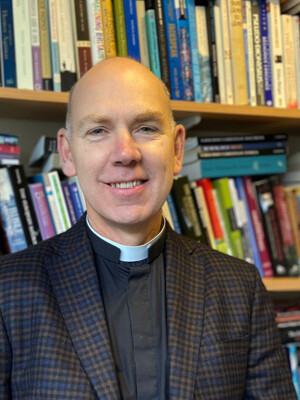“How do we train ministers for the Church of the Future?”: St Augustine’s new Chair of Trustees on asking the big questions
Earlier this year, the Rt Revd Dr Martin Gainsborough, the Bishop of Kingston, joined the College’s Board of Trustees as its new Chair. Here, Bishop Martin shares with us his excitement at stepping into the role and his hopes for the future of theological education.

The Rt Revd Dr Martin Gainsborough, Bishop of Kingston
“One of the things St Augustine’s does incredibly well is meeting people where they are, whatever their educational background.
Since being appointed as Chair of the Board of Trustees of the College, I’ve seen firsthand how we support the needs of our students.
The College encourages and helps students to rise to the challenges that lie ahead of them; whether that’s how to craft a good essay, how to take notes on a text, or more applied aspects of ministerial formation.
However, as a theological training institution preparing the next generation of ministers, we also need to ask ourselves the bigger, more difficult questions.
Namely, what is it we are training people for? And what is it to train people for ministry today?
“What kind of Church are we training people for?”
For me, the answer to questions like these are really interesting, because to answer them you first have to ask, “What is the Church of the future that we are training people for?”.
If a recently ordained minister in their mid-30s remains active in ministry for 30 years, their training today needs to still be serving them in 2050.
Now, I’m the first to say I don’t have all the answers. We can’t know what the Church of the future will be like. But by asking that question, we can start to identify what aspects of ministerial training are most important.
We can start to work out what particular skills will people need in ministry going forward, to better prepare them for the Church of the future.
The Church of the future and what ministers need from their colleges
Vicars have always been expected to have a wide and diverse skill-set. Part of theological education and training is opening ordinand’s eyes to the breadth of skills that may well be needed.
Traditionally, ordination training institutions have prioritised the development of leadership skills and theological knowledge. But to prepare ministers for the Church of the future, we need to look beyond this – which is what St Augustine’s is already doing.
“It’s important that past experience is not lost or forgotten.”
When people come for theological education and training, they bring with them a whole host of life skills; particularly if they’re coming along a bit older in life. Those skills can be honed and developed and brought to bear in their ministerial life.
Through ministerial training, we want to make the connection between experiences ordinands have had in their past life with what and who they want to be now, as ministers.
I think it’s important that past experience is not lost or forgotten and instead, it becomes a foundation to develop the skills they’ll need in today’s (and tomorrow’s) Church.
Translating the complex into the understandable
When people come to a theological college to train for ministry, some will already be educators or academics. But ultimately, that’s not what we’re training people for.
Yes, we might want to encourage students to carefully read some weighty tomes or difficult texts. But we also want them to be able to speak about the subject matter in ways that people who haven’t got a degree in theology can relate to.
We’re training people to minister in an increasingly secular and fast-paced world. Ministers need to be able to communicate with people who may have little experience with the Christian faith. That means being able to put complex ideas into plain English, so people can connect with them.
After all, as ministers, we’re here to bring the Christian faith to life; to show whoever we’re talking to how exciting, meaningful and transformative it can be.
Speaking in “plain language” and making yourself understood
I came to the study of theology quite late in life. I was already working in academia (in politics and international development) but when I first encountered theological study, I remember thinking, “This is so exciting”.
And it is! Theology is an extremely exciting, rich discipline; not least because it asks such fundamental questions about God, our purpose, and what it is to be human.
As theological institutions, we need to equip ministers with the means to communicate that excitement in ways everyone – even folks unfamiliar with the Church – can understand.
The power and importance of accessible language
The sermon or the homily is a great example of the “translation” skills ministers need.
Whatever reading you’ve done, whatever clever books you’ve read, as a minister, you still need to be able to communicate your ideas in a way that relates to people and their lives. The language needs to be accessible.
Speaking as someone with a higher education background, I personally don’t like when academics speak in a way that it makes it hard to understand their field of study. Why shouldn’t we share our ideas in plain language?
The same is true in ministry; as ministers, we have a responsibility to avoid using jargon in our sermons. This core approach is something I’m pleased and excited to see St Augustine’s already leading the charge on.
Training people to be themselves and bringing out individual gifts
Ultimately, we’re training ministers to be comfortable in the world – whether they’re speaking to their congregation or someone with little to no experience of the Christian faith.
The key word here is authenticity. Our training is about trying to bring out people’s innate gifts and personalities. We want to draw out what’s within our ordinands and lay readers, so they can minister in a distinctive and unique way.
As part of that, we also want to embrace the struggles that people have gone through; the times that have been hard, when we’ve experienced loss, confusion or failure. Every part of life is important and as theology colleges, we need to encourage people to bring all of these experiences to bear in their formation.
Our uniqueness is integral to who we are. It’s what can be seen shining through when we glimpse something of God, or of Jesus, at work in someone. It’s very powerful.
Our continuing mission
I feel very lucky to have been brought on as Chair of the Board of Trustees at St Augustine’s.
The College is such a dynamic and exciting learning environment. Everyone here does their utmost to ensure our students receive a rich and fulfilling theological education, and to provide our future ministers the training they need to lead the Church of the future.
I can’t wait to support the College and its community in our continuing mission.”

